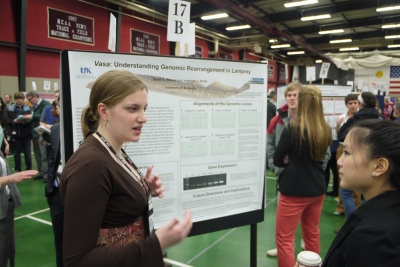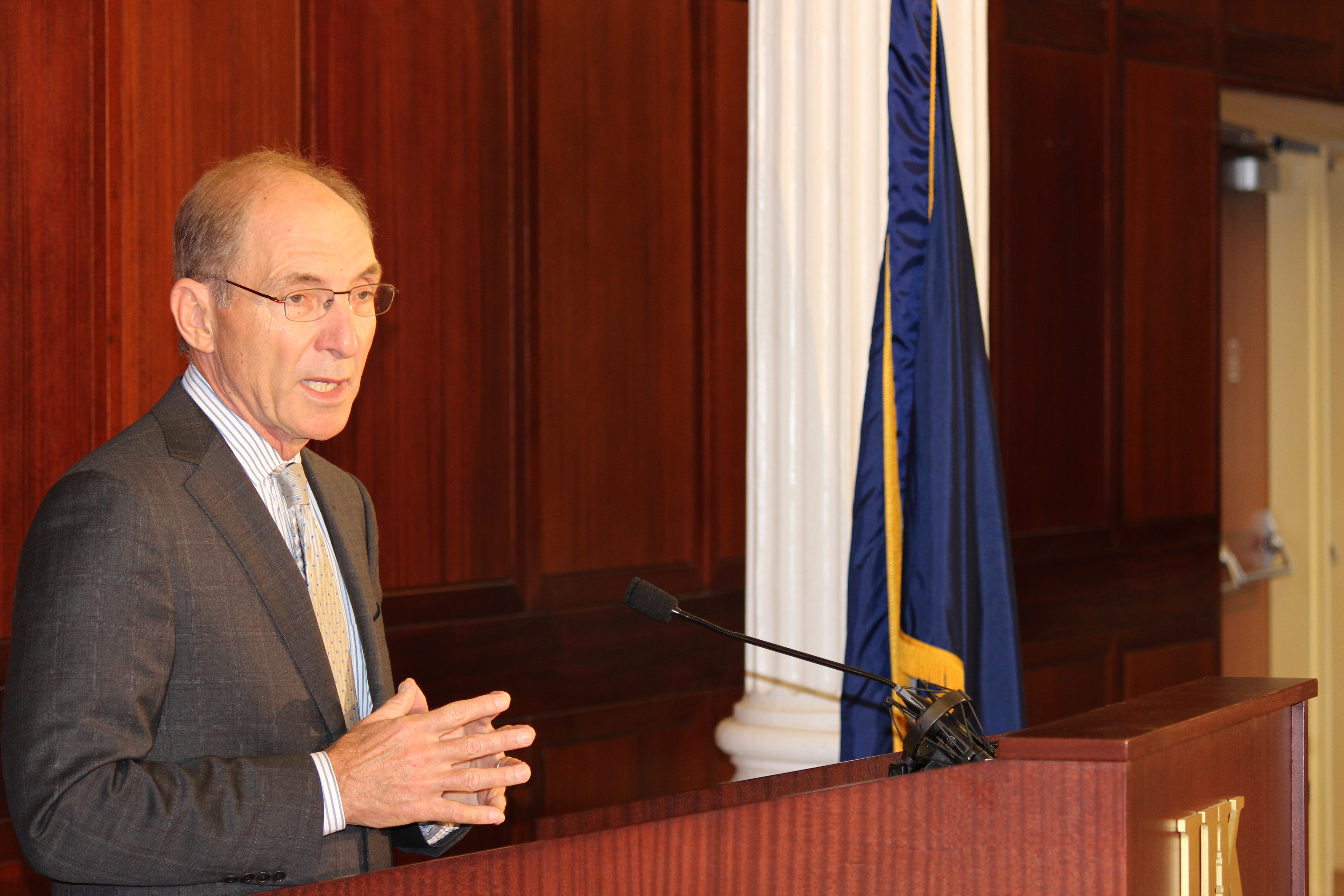by Keith Hautala
(June 3, 2014) — The University of Kentucky has been awarded a $1.9 million grant to improve retention of students in the STEM disciplines: science, technology, engineering and mathematics, through a collection of initiatives dubbed "STEMCats."
UK is one of 37 research institutions selected by the Howard Hughes Medical Institute (HHMI) to receive an award, from among 170 institutions competing for a share of $60 million in total funding. The five-year awards, ranging from $1.2 to $2.4 million, are intended to enable schools to focus on "significant and sustained improvement in retaining students" in the STEM disciplines.

Although the need for STEM graduates is growing nationally, fewer than half of all students who enter college with the intention of majoring in aSTEM field leave with a STEM degree. Nationwide, STEM matriculation rates hover around 40 percent, but the rate is only half that, roughly 20 percent, among historically underrepresented ethnic groups.
Part of the challenge for educators is that many first-year students arrive on college campuses without adequate preparation for the rigors of college-level science and math, said Professor Vincent Cassone, chair of the UK Department of Biology and STEMCats project director.
"They have no idea what to expect, and I think it comes as a shock to some of them just how much work is actually involved in passing an introductory-level STEM class," Cassone said. "By the time they realize it, they may already be in trouble. It's not that they can't do the work. They just are not mentally and psychologically prepared for the challenges they face at the university level. The STEMCats initiatives are designed to help students get ready to succeed."
UK is partnering on these initiatives with colleagues from Bluegrass Community and Technical College (BCTC). Tammy Liles, BCTC's associate dean for natural science, is associate STEMCats project director.
"BCTC is excited to be a partner in this very innovative STEMCats program," Liles said. "With both institutions working together to increase and retain students in the STEM pipeline, STEM students at BCTC will have opportunities to work in UK research facilities, live in STEM-designated communities at UK, and be part of a FastTrack student cohort designed to remove barriers of success while enhancing STEM opportunities and knowledge."
Mark Lawrence Kornbluh, dean of the UK College of Arts and Sciences, said that collaboration is a core strength of the STEMCats project.
"The strong collaborative relationship of this grant is a hallmark to the initiative, and will serve the program well in its multi-layered approach to improving student success, diversity and retention in STEM education," Kornbluh said. "The grant’s attention to all areas of instruction — in-class pedagogy, co-curricular research experience, preparatory training, residential life experience, among others — demonstrates the thoughtful commitment the university as a whole has to the success of STEM education at UK."
 UK President Eli Capilouto said the HHMI award provides critical support for the future of university research, which will in turn produce dividends for the Commonwealth and the nation as a whole.
UK President Eli Capilouto said the HHMI award provides critical support for the future of university research, which will in turn produce dividends for the Commonwealth and the nation as a whole.
"The twenty-first century economy, and Kentucky’s future economic readiness, will be built upon innovative solutions to complex challenges," Capilouto said. "At the leading edge of the innovation-based economy is the American research university, the faculty who create new knowledge through research and discovery, and the students we teach. The grant support from HHMI we are announcing today will bolster our effort — in partnership with BCTC — to improve retention rates in STEM education, to create a talented workforce for Kentucky, and to prepare the next generation of creative scholars."
The STEMCats project has five key components, each aimed at improving the recruitment, preparation and retention of STEM majors.
1. 'FastTrack' Courses for Math, Biology, Chemistry and Physics
To improve preparation of incoming students, two residential FastTrack courses, in biology and chemistry, will be offered preceding their fall admission, in addition to the successful math FastTrack courses already being offered. Similarly, a physics FastTrack course will be offered preceding the start of the physics curriculum in the sophomore year. Each course will be one week in duration.
2. STEMCats Living Learning Community
Based on the successful model of the "Wired" Arts and Sciences freshman residential college, students enrolled in the STEMCats program will be immersed in a community of learners within one of the residence halls on campus. There, they will engage in constant community-based academic and social activities. STEMCats from underrepresented minorities will have additional support from sophomore mentors from minority backgrounds, who will also reside in the community.
3. Freshman STEM Research Course
A new, multidisciplinary and inquiry-based research course — containing discussions, seminars, workshops, discovery-based wet-lab activities, and scientific and professional development activities — will be piloted in a year-round course that meets weekly. Course meetings will be conducted by a Community of Scholars, comprising research faculty from across campus and by invited external experts.
4. Team-based Summer Research Experience
During the summer session at the end of their freshman year, groups of eight to 10 STEMCats will join a research project in a laboratory of a faculty member in the Community of Scholars. STEM faculty across campus will be recruited as mentors for a cohort of 200-250 students each summer. The research experience will be enriched by research-related educational and professional activities, including students' presentation of their work in science forums.
5. Improving Introductory STEM Curriculum
Following the successful model of the current, two-part "Calculus for Life Sciences" series, new introductory chemistry and physics courses will be developed, with an interdisciplinary focus and a life-sciences orientation. Biology-enriched chemistry introductory courses are already underway.

These contact-intensive initiatives are being developed alongside vast advances in instructional technology, such as MOOCs (massive online open courses), which enable thousands of students to share a virtual classroom with a virtually unlimited seating capacity. Incorporating digital texts, video-based lectures, interactive virtual demonstrations, online discussion, and self-administered quizzes, MOOCs can be a cost-effective way to provide standardized instruction to many students at once.
UK launched its own successful Basic Chemistry MOOC this spring, developed by UK faculty in partnership with the educational technology company Coursera. Some 10,000 registered for the eight-week, college-preparatory course, far exceeding the university's expectations.
While advances in instructional technology are helping instructors to be more effective, Cassone says there is still a real need for direct interaction between students and teachers.
"While the inclusion of instructional technology is a very exciting addition to the lexicon of educational tools in higher education, engaging students by committed professors and instructors, and exposing students to scientific research early in their academic lives will be critical in improving retention in diverse STEM majors and future careers," he said. "This is what STEMCats is all about — technology and scientific research with a human touch."
MEDIA CONTACT: Keith Hautala, keith.hautala@uky.edu, (859) 323-2396
